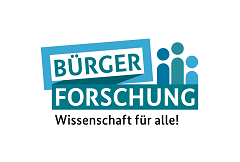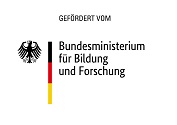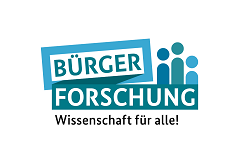Current Projects:
SelEe – Researching rare diseases through citizen science!
Project period: 01.04.2021 – 31.03.2024
SelEe is a joint project with Medical Informatics Group of the University Hospital Frankfurt (MIG).
The project is funded by the Federal Ministry of Education and Research as part of the Citizen Research funding area. It is one of 15 projects that will advance the collaboration of citizens and scientists in terms of content and methodology and provide answers to societal challenges until the end of 2024.
For more information, please visit: https://www.bmbf.de/de/buergerforschung-225.html and http://www.buergerschaffenwissen.de/
In Europe, a disease is considered rare if it affects no more than 5 in 10,000 people. On the way to diagnosis, affected people often experience a doctor’s “odyssey”, since specialists and specialized facilities for these diseases are also rare. With about 8000 different rare diseases and about 4 million affected people in Germany, the findings of science are more difficult to access. Affected people organize themselves in self-help groups and often become experts for their respective diseases.
SelEe therefore wants to gain new knowledge in the field of rare diseases together with citizens. To this end, citizens contribute their knowledge, experience and ideas directly to the project, develop new approaches and improve the cooperation between all stakeholders, thereby contributing to the improvement of the care and treatment situation of people with rare diseases.
Throughout the research process, citizens are involved and supported by scientists. Already in the first steps of the research process, citizens can participate and actively shape the research goals in workshops, which can contribute to the expansion of knowledge in the field of rare diseases. There will be several (online) workshops, but the exchange will mainly take place via a virtual platform during the course of the project.
Participation is open to all citizens who suffer from rare diseases themselves, who suspect it, who care for affected persons or who are interested in advancing research in the field of rare diseases.
The data obtained will be evaluated jointly by the citizens and researchers. The data is collected in the project via the online-based SelEe platform and made available there anonymously for joint work. Citizens can contact the researchers directly, e.g. by e-mail or via regular online video conferences.
In addition, citizens are regularly informed about news, current statistics are published and current research findings obtained through SelEe are made available for discussion.
In SelEe, citizens help to answer questions in the field of rare diseases and citizen research themselves. First of all, SelEe makes it possible to collect knowledge and experiences of people affected by different rare diseases, to identify commonalities and to research and develop new approaches, e.g. with regard to communication, treatment, diagnosis and documentation.
This in turn helps researchers, caregivers and experts to address the needs of individual rare diseases in a more individualized and specialized manner and thus improve the overall quality of care in the field of rare diseases.
The knowledge gained can directly inform treatment and the future design of research. Finally, SelEe shows that citizen science can also provide valuable insights in the medical field.
A concept is currently being developed to recruit interested citizens for the selection of diseases to be studied and the development of research questions. In the context of the Forum Citizen Science 2021, a networking of participants in the field of citizen science projects with health and medical relevance is taking place in the working group Citizen Science in Medicine and Health Research.


Headache register of the DMKG
Together with smartlytic GmbH – a spin-off of three former employees of the research group Analytical Information Systems – and the research group Law in Sustainability, Compliance and IT, the research group conceptualizes and implements the headache registry of the German Migraine and Headache Society (DMKG).
For more information, visit https://www.kopfschmerzregister.de/.
moma – modules on migraine activity
Migraine is a common disease that can have a lasting negative impact on the overall quality of life. Accordingly, migraine is among the top 10 most debilitating diseases worldwide in the “burden of disease” study. Migraine often begins as early as primary school age. After a confirmed diagnosis in childhood, 60% of those affected continue to have migraines in adulthood. The early treatment of affected children is intended to prevent chronicity of migraine with progressive restriction of the quality of life. For this purpose, a structured interdisciplinary, multimodal early intervention for children with migraine aged 6 to 11 years was developed, which is being evaluated within the framework of the moma project.
The early intervention developed by LMU Munich is technically enabled by the smartphone apps for children and parents developed in the iisys as well as the web applications for the participating paediatricians and social paediatric centres. In these, all participating doctors are provided with the current diagnostic criteria. All parents record the frequency and severity of headache attacks and their treatment in the app. The paediatricians and adolescent doctors receive an overview of the data directly during the appointments in the practice. This enables parents and doctors to better monitor and assess the course of the disease.
After the implementation of the early intervention measures in the medical practices and social paediatric centres, their effectiveness will be evaluated within the framework of the project.
For more on the project, visit https://www.moma-migraine.de/.
Headache radar
The Headache Radar comprises the two projects Migraine Radar (Mira) and Cluster Headache Radar (Clura).
The essential idea is that people affected by cluster headache or migraine often have an idea about what could be the triggers of their attacks. However, it is often difficult to verify these assumptions, as many different trigger patterns exist and – especially in the case of cluster headache – studies on seizure triggers are lacking due to the rarity of the disease. This is where the project comes in: Seizure data will be collected from a large number of sufferers over a period of one year and examined for the correlations expressed in advance.
The Headache Radar is a citizen science research project. This means in particular that those affected and interested, e.g. also pupils and students, are involved in the entire research process – from the definition of the research questions to the publication of the research results. Research is being conducted into triggering factors for cluster headache and migraine attacks as well as the effectiveness of acute treatment methods.
More about the project can be found at www.kopfschmerz-radar.de.


The project is funded by the Federal Ministry of Education and Research as part of its Citizen Research funding area.
It is one of 13 projects that will advance the collaboration of citizens and scientists in terms of content and methodology and provide answers to societal challenges until the end of 2019.


Completed projects
eNurse® – Telemedicine Project
One of the most pressing problems in the greater Hof area is caused by demographic change. More and more doctors are retiring and the population is getting older. It is extremely difficult to fill the vacancies of general practitioners, so that only attractive practices are able to find a successor. In fact, there is already an acute shortage of doctors in the region, which means that the remaining doctors can hardly cope with the increase in patients. This is where the eNurse® project comes in. Specially trained non-physician staff are to support both general practitioners and specialists and take over some of the home visits.
In addition to the usual treatment materials, the eNurse® has a notebook with touch display. With this, the medical staff is able to contact the doctor, document the course of treatment directly on site and transfer it to the practice.
Through this project it is possible to relieve and support the doctor to such an extent that he can be there for his patients in his medical practice and still maintain the medical care in the rural region at a high level.
The project is carried out by the company Gesundheit Hochfranken GmbH & Co KG (UGHO) and is accompanied by the research group Analytical Information Systems.
Mobility Digital Hochfranken
The aim of the project is to make mobility in rural areas more economical, attractive and environmentally friendly, and to strengthen Germany as a digital location through new solutions for data use.
Our project partners are the district of Hof, the district of Wunsiedel im Fichtelgebirge, the city of Hof, Frauenhofer – Institute for Integrated Circuits IIS as well as the Technical University of Munich, Chair of Traffic Engineering.
The project is funded by the Federal Ministry of Transport and Digital Infrastructure as part of the mFUND research initiative.
WISE – Web-based interdisciplinary symptom questionnaire
The project has been conducted since 2016 in collaboration with the Center for Dental Medicine at the University of Zurich.
The aim of the project is to operate a web-based interdisciplinary symptom questionnaire. Patients answer a comprehensive, dynamically created questionnaire, which can then be viewed and evaluated by the treating center for the respective patient. The data is stored in such a way that only the treating center can link the questionnaire data with the patient master data. On the other hand, statistical evaluations of all data can be created in anonymous form, so that the collected data can serve as a basis for medical studies.
Teachers’ calendars – digitisation of handwritten data
The research group has been cooperating with FLVG Verlagshaus since August 2013. The company, based in Straßberg, Saxony, has been producing teacher and pupil planners for over 20 years, supplying specialist retailers and schools throughout Germany.
The task of the project is to make handwritten information, in particular grades, available digitally for further electronic processing. The necessity for this arises from the fact that, on the one hand, paper-based recording of grades is often prescribed for teachers, but, on the other hand, computer-supported further processing is desired. Therefore, the research group develops methods for the digitalization of handwritten information. The teacher will be able to photograph the calendar, note and grade pages with a mobile device and then, for example, digitize the students and their grades with the help of OCR methods (Optical Character Recognition) in order to subsequently process them electronically.
The project is supported by the European Regional Development Fund (ERDF) with funds from the European Union and the Free State of Saxony as part of the “Innovation Premium” program.
ATMT – Development of a novel analysis method for the investigation of topics and opinions in unstructured texts
An increasing share of the data flood in companies consists of texts (e.g. customer inquiries, customer reviews). The use of the information contained therein is becoming increasingly important: Text mining is the key technology for this.
Within the framework of the “Central Innovation Programme for SMEs” (ZIM), an innovative text mining method is being developed in cooperation with puls Marktforschung GmbH and the “Automatic Language Processing” department of the University of Leipzig (Prof. Heyer).
By building comprehensive linguistic databases and integrating them with special data analysis algorithms, a significant improvement in text mining results is expected compared to conventional and standardized methods. Especially with regard to the identification and summarization of topics and opinions in unstructured texts, the approach promises more detailed insights and a significant improvement in accuracy.
The project runs over two years and started in autumn 2014. The research group would like to thank the Federal Ministry for Economic Affairs and Energy for funding this innovative project.
Project partner pulse: www.puls-marktforschung.de/instrumente/zim-forschungsprojekt.html
politwi – analysis of political tweets on the parliamentary election 2013
politwi consists of politics and Twitter. The aim is to analyze freely available political tweets ahead of the parliamentary elections 2013 in Germany. Here, the used hashtags used are analyzed and identified in particular the latest trends.
It is a research project at the Institute for Information Systems (iisys) at Hof University in collaboration with the “Big Data Analytics Research Lab” at the Goethe University Frankfurt. Besides politwi, we deal with the automatic analysis of textual data (text mining), in particular with the extraction of opinions (opinion mining). politwi enables us to apply the methods and procedures we have developed in practice.
Article in the Frankfurter Rundschau (10.09.2013):
http://www.fr-online.de/bundestagswahl—hintergrund/politwi-de-forschungsprojekt-analysiert-tweets-zur-wahl,23998104,24261442.html
Online discussion with the “Digital Quartet” and the Media Network Bavaria, Berlin:
http://www.youtube.com/watch?v=U6VsNjtviGw&feature=c4-overview&list=UUj0gCBngluX0CpIbFrVmqcA
PoliTwiUS – Analysis of political tweets for the USA
PoliTwiUS examined tweets on political topics similar to politwi for Germany, but for the USA.
Opinion mining for the insurance industry
This project aims to mechanically evaluate expressed opinions in Web 2.0 platforms which refer to insurance companies and their products or services. It is examined how opinion mining can be optimized for the German language so that it can be used profitably by the insurance sector. The project is carried out in close co-operation with nobiscum GmbH and promoted by the Bavarian State Ministry of Economics, Infrastructure, Transport and Technology
Opinionlist I – Generating a list of opinion-forming adjectives for the German language
Opinion mining extracts opinions from unstructured texts. Opinions are often expressed by using adjectives (e.g. “This mobile is a bad one.”) The aim of the project is to match numerical values with those opinion-forming adjectives which show how positive or negative an expressed opinion is. For this purpose, we use a method of machine learning which is based on the analysis of product reviews.
Opinionlist II – Generating a list of opinion-forming nouns for the German language
The aim of this project is to create a list of nouns together with values regarding opinions. For example, a negative value would be assigned to the word “waste” whereas “success” would get a positive value. The list is based on customer reviews and lexical relations (e.g. synonyms, antonyms). The opinion list can be used for future projects in the field of opinion mining, e.g. for the determination of the general sentiment (positive or negative) of a text.
 EN
EN